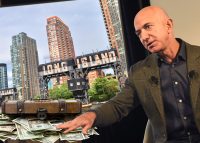It took almost $1 billion of publicly funded incentives to swing a Samsung real estate deal that Texas Gov. Greg Abbott’s office called “the largest foreign direct investment in Texas on record.”
About $981 million from state and local authorities helped convince the South Korean company this year to build a $17 billion semiconductor factory on a 1,200-acre field near the central Texas town of Taylor, according to the Austin American-Statesman. Taylor, 30 miles northeast of Austin in Williamson County, has about 18,000 residents.
The incentives include $954 million of property tax breaks from the city, county and school district over the 30-year life of the contracts. That’s in addition to a $27 million grant from a state incentive fund.
A database run by public-interest group Good Jobs First ranks it the biggest corporate incentive deal of its type in Texas history, the Statesman reported. An additional $260 million of infrastructure improvements near the site will be funded mostly by the city, county, and state. They include roads that officials said were part of existing long-range plans. Samsung’s user fees will repay the cost of extending water and sewer service for the factory, according to the city.
Samsung’s only existing US semiconductor plant is in nearby Austin. The company chose the Taylor location rather than building on a lot it owns next to that factory. Sites in Arizona and New York were also in the running.
The plant will bring about 2,000 Samsung jobs and may fuel economic growth in the area. Officials say the project will net the city about $52.2 million of property tax revenue during the deal’s 30-year life. The city will rebate about 92 percent of Samsung’s property taxes during the project’s first decade, 90 percent in the second and 85 percent in the third.
Read more


[AAS] — Cindy Widner
